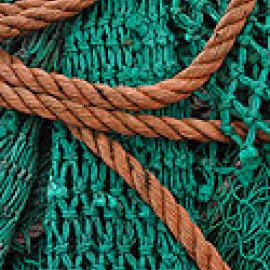At the Fishhouses, 2024
-
English
-
ListenPause
[intro music]
Welcome to World Ocean Radio…
I'm Peter Neill, director of the World Ocean Observatory.
“I always had a daydream…” the poet Elizabeth Bishop wrote to her friend Robert Lowell, “…of being a lighthouse keeper, absolutely alone.” Bishop lived on islands and near the shore as often as she could: Nantucket and Cuttyhunk off Massachusetts; Nova Scotia and Newfoundland; Key West; and North Haven Island in Maine.
Here's a poem published in the New Yorker in 1947 that pertains to the New Year, distills many years of Bishop’s seaside meditations, and evokes the clarity of meaning contained in personal encounters with the world ocean.
At the Fishhouses, is among our favorite poems here at World Ocean Observatory. In its richly-detailed mastery, it distills Bishop’s seaside meditations, evokes the clarity of meaning contained in personal encounters at the shore and with the ocean, and holds the reader and the listener in the space that lies between land and sea, a site of transience, mystery, and the sublime.
AT THE FISHHOUSES
Although it is a cold evening,
down by one of the fishhouses
an old man sits netting,
his net, in the gloaming almost invisible,
a dark purple-brown,
and his shuttle worn and polished.
The air smells so strong of codfish
it makes one's nose run and one's eyes water.
The five fishhouses have steeply peaked roofs
and narrow, cleated gangplanks slant up
to storerooms in the gables
for the wheelbarrows to be pushed up and down on.
All is silver: the heavy surface of the sea,
swelling slowly as if considering spilling over,
is opaque, but the silver of the benches,
the lobster pots, and masts, scattered
among the wild jagged rocks,
is of an apparent translucence
like the small old buildings with an emerald moss
growing on their shoreward walls.
The big fish tubs are completely lined
with layers of beautiful herring scales
and the wheelbarrows are similarly plastered
with creamy iridescent coats of mail,
with small iridescent flies crawling on them.
Up on the little slope behind the houses,
set in the sparse bright sprinkle of grass,
is an ancient wooden capstan,
cracked, with two long bleached handles
and some melancholy stains, like dried blood,
where the ironwork has rusted.
The old man accepts a Lucky Strike.
He was a friend of my grandfather.
We talk of the decline in the population
and of codfish and herring
while he waits for a herring boat to come in.
There are sequins on his vest and on his hands.
He has scraped the scales, the principal beauty,
from unnumbered fish with that black old knife,
the blade of which is almost worn away.
Down at the water's edge, at the place
where they haul up the boats, up the long ramp
descending into the water, thin silver
tree trunks are laid horizontally
across the gray stones, down and down
at intervals of four or five feet.
Cold dark deep and absolutely clear,
element bearable to no mortal,
to fish and to seals . . . One seal particularly
I have seen here evening after evening.
He was curious about me. He was interested in music;
like me a believer in total immersion,
so I used to sing him Baptist hymns.
I also sang "A Mighty Fortress Is Our God."
He stood up in the water and regarded me
steadily, moving his head a little.
Then he would disappear, then suddenly emerge
almost in the same spot, with a sort of shrug
as if it were against his better judgment.
Cold dark deep and absolutely clear,
the clear gray icy water . . . Back, behind us,
the dignified tall firs begin.
Bluish, associating with their shadows,
a million Christmas trees stand
waiting for Christmas. The water seems suspended
above the rounded gray and blue-gray stones.
I have seen it over and over, the same sea, the same,
slightly, indifferently swinging above the stones,
icily free above the stones,
above the stones and then the world.
If you should dip your hand in,
your wrist would ache immediately,
your bones would begin to ache and your hand would burn
as if the water were a transmutation of fire
that feeds on stones and burns with a dark gray flame.
If you tasted it, it would first taste bitter,
then briny, then surely burn your tongue.
It is like what we imagine knowledge to be:
dark, salt, clear, moving, utterly free,
drawn from the cold hard mouth
of the world, derived from the rocky breasts
forever, flowing and drawn, and since
our knowledge is historical, flowing, and flown.
Best wishes for the New Year from World Ocean Radio the World Ocean Observatory.END
At the Fishhouses, is among our favorite poems here at World Ocean Observatory. In its richly-detailed mastery, it distills Bishop’s seaside meditations, evokes the clarity of meaning contained in personal encounters at the shore and with the ocean, and holds the reader and the listener in the space that lies between land and sea, a site of transience, mystery, and the sublime. It is a seasonal favorite for those of us that dwell at the water's edge. Happy New Year from World Ocean Radio and World Ocean Observatory.
At the Fishhouses is among our favorite poems, and is a clear winner for the season. We hope it is for you, too, whether you are revisiting a reading or are hearing it for the first time. It speaks to all of us that dwell at the water's edge, in a physical space or merely in the mind.
Cold dark deep and absolutely clear,
element bearable to no mortal,
to fish and to seals . . .
Happy New Year from World Ocean Radio and World Ocean Observatory.
Please consider a gift in support of our continued good work for the world ocean.
The sea connects all things.
- Login to post comments



